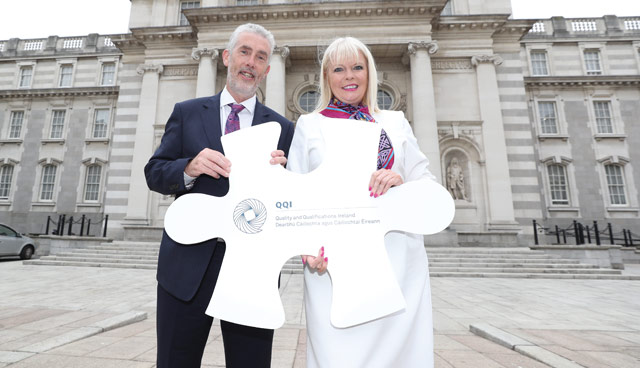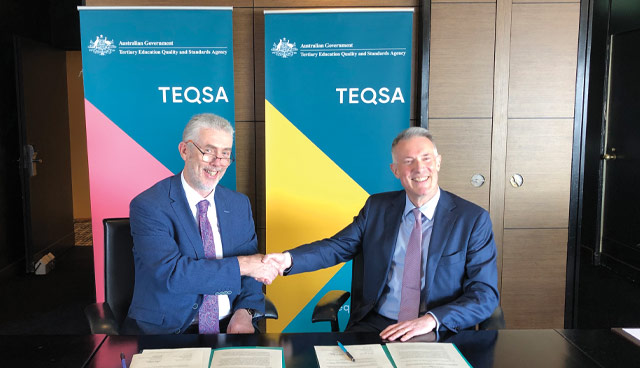Clamping down on academic cheating in Ireland

New Legal Powers for QQI
Technological developments have driven a change in both the nature and sophistication of academic cheating and in the level of detection rates, both nationally and internationally. Contract cheating often consists of companies, regularly referred to as “essay mills”, selling learners bespoke assignments, essays and even theses which learners then submit for assessment as their own work.
The changing face of academic cheating
Companies advertising such services claim that their products are “plagiarism free”, that they are original pieces of work and reassure learners that they are not breaching plagiarism restrictions by using them. Risk of detection is lower as such assignments are harder (or even impossible) to detect by the anti-plagiarism software commonly used by education and training institutions. A recent UK research study found that as many as one in seven recent graduates may have paid someone to undertake an assignment for them.
Threat to the reputation of Irish education
The facilitation of learner cheating by “essay mills” has been recognised by Quality and Qualifications Ireland (QQI) as a growing threat to the integrity of Irish education. A number of significant exposures of academic cheating in other jurisdictions have come to light in recent years, drawing attention to this new and growing form of cyber-crime which presents a significant threat to academic integrity, risking reputational damage to the entire Irish education system, at home and abroad.
What is QQI’s role in combatting academic cheating?
Quality and Qualifications Ireland is the independent State agency responsible for promoting quality and accountability in education and training services in Ireland. Our broad remit includes responsibility for the QQI award, the National Framework of Qualifications, and quality assurance of education and training institutions and programmes.
In short, we aim to give people – learners, educators and employers – confidence in the Irish education and training system and the qualifications they get from it.
Following representations by QQI to the Department of Education and Skills, a new provision was included in the Qualifications and Quality Assurance (Education and Training) (Amendment) Act which was enacted in July 2019.
This provision empowered QQI to prosecute the facilitation of academic cheating.
Legal powers
This new legislation provides QQI with the statutory powers to prosecute those who:
- assist learners to cheat by completing, in whole or in part, any piece of work required of the enrolled learner for their programme of study, or sit an exam or facilitate the sitting of an exam by someone other than the enrolled learner or provide answers for an exam;
- advertise cheating services; or
- publish advertisements for cheating services.
The legislation applies to academic cheating in further and higher education and training. Penalties can range from fines of up to €100,000 per offence and/or prison sentences of up to five years, depending on the nature of the offence.
Partnership across borders
While QQI has been equipped with robust legal powers to tackle those who provide cheating services, international research suggests that a co-operative approach between regulators such as QQI, and education and training providers as well as students, with a greater focus on detection that deterrence will reap rewards.
Dr Padraig Walsh, Chief Executive Officer of QQI, highlights the national systemic benefits of adopting a collaborative approach to tackling academic cheating: “We welcome the commencement of this important new legislation which allows QQI to tackle an area we have identified as posing a significant risk to the reputation and integrity of the Irish education and training system. QQI will engage in an extensive programme of collaboration with key stakeholders to help them understand their respective responsibilities in this area – students in understanding the damaging effects of cheating to the integrity of their qualification; institutions in creating a culture which deters cheating and developing robust systems and student supports to counteract cheating; and publishers and advertisers in navigating their new legal obligations in relation to advertising content for these, now illegal, services.”
Walsh continues: “This is a global problem from which no institution is immune, and QQI will work closely with international counterparts, in countries such as the UK and Australia, in sharing information and best practice to achieve the best outcomes for the reputation of Irish education and training.”
In this respect, QQI recently signed a Memorandum of Understanding with its Australian sister agency, the Tertiary Education Quality and Standards Agency (TEQSA), which will see the two organisations share information and offer professional advice about academic fraud and contract cheating.
QQI staff have presented recently at a European conference focused on the extent of academic malpractice in Europe and the steps taken by different countries to prevent and detect it. The delegates reviewed a draft Council of Europe policy framework Countering Education Fraud intended to promote ethics, transparency and integrity in education. QQI is also contributing to the development of policy in this area at EU level. A coordinated international effort is critical to the success of responses to this global problem.

Chief Executive of the Tertiary Education Quality and Standards Agency (TEQSA), Australia.
Other Changes for QQI
The Qualifications and Quality Assurance (Education and Training) (Amendment) Act 2019 has brought other significant changes for QQI and its work which will ultimately provide benefits and protections to national and international students.
Allow professional bodies or international awarding bodies to include their qualifications in the National Framework of Qualifications, the 10-level system used to classify qualifications in Ireland.
This will create more and better qualifications pathways for learners, enhance learner mobility and their progression opportunities, and promote fair recognition of learning achievements.
Allow QQI to examine the corporate fitness of private education and training providers, including their compliance with national employment law.
Experience of past college closures and difficulties with providers can be linked directly to failures in corporate governance and financial management. QQI can now evaluate a provider’s corporate fitness, including the bona fides and financial status of a provider and their capacity to engage with quality assurance processes.
Introduce an International Education Mark (IEM) for the higher education and English language education sectors.
The International Education Mark (IEM) is part of a national strategy to strengthen Ireland’s reputation for international education. The IEM will ensure that international learners can expect a high-quality educational experience from enrolment to completion of a programme of education and training.
Establish a national scheme for the protection of enrolled learners in the event of the sudden closure of an education or training provider.
This measure will ensure that learners who commence a programme can be confident that they can complete their programme or receive a refund of fees paid, where a provider ceases to offer their programme or ceases to trade.
Certain new functions for QQI contained in the amending legislation will require ministerial regulations or statutory instruments to be enacted by the Minister.
National Academic Integrity Network
As an initial step, QQI has established a National Academic Integrity Network representing public and private higher education and training providers, and learner representatives to identify good practice in dealing with cheating and develop ways to report and penalise instances of cheating within HEIs.
This network will address higher education in the first instance as international research has identified this sector as particularly vulnerable to contract cheating. This initiative will be extended to the further education and training sector in 2020.
T: +353 1 905 8100
W: www.qqi.ie






